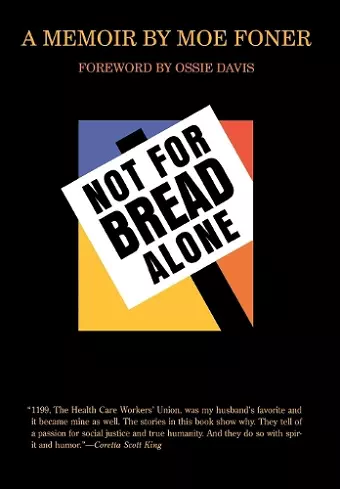Not for Bread Alone
A Memoir
Dan North author Moe Foner author
Format:Hardback
Publisher:Cornell University Press
Published:15th Aug '02
Currently unavailable, and unfortunately no date known when it will be back

"I operated under the theory that a good union doesn't have to be dull."—Moe Foner
"Don't waste any time mourning—organize."—Joe Hill
Moe Foner, who died in January 2002, was a leading player in 1199/SEIU, New York's Health and Human Service Union, and a key strategist in the union's fight for recognition and higher wages for thousands of low-paid hospital workers. Foner also was the founder of Bread and Roses, 1199's cultural program created to add dimension and artistic outlets to workers' lives.
Foner produced a musical about hospital workers; invited Woody Guthrie and Pete Seeger to perform for workers and their children; presented stars such as Ossie Davis and Ruby Dee, Sidney Poitier, Harry Belafonte, and Alan Alda; and installed the only permanent art gallery at a union headquarters. One of Foner's last projects was a poster series called "Women of Hope," which celebrates African American, Native American, Asian American, and Latina women including Maya Angelou, Maxine Hong Kingston, Septima P. Clark, and the Delaney sisters Sarah and Elizabeth. Today his legacy is the largest and most important cultural program of any union.
Not for Bread Alone traces Foner's development from an apolitical youth whose main concerns were basketball and music to a visionary whose pragmatism paved the way for legislation guaranteeing hospital workers the right to unionize. Foner writes eloquently about his early life in Brooklyn as the son of a seltzer delivery man and about many of the critical developments in the organization of hospital workers. He provides an insider's perspective on major strikes and the struggle for statewide collective bargaining; the leadership styles of Leon Davis, Doris Turner, and Dennis Rivera; and the union's connection to key events such as the civil rights movement and the Vietnam War.
The great purity of his efforts and his steadfastness to the unions make his memoir an important addition to the history of American unions.
* Los Angeles Times *The book... traces Foner's own career as a labor PR man par excellence and contains much useful advice for today's 'union communicators.'.... For example, Foner's pioneering work on 1199 campaigns among private, nonprofit hospital workers—who didn't have the right to bargain with management forty years ago—provides a good model for any union trying to make organizing rights a higher-profile issue today.
* The Nation *In Not for Bread Alone, Foner remembers the plays, art exhibits, and lecture series he brought to workers when he began the Bread and Roses Cultural Project.... From 1952 to 2002, he fought alongside workers in the battle to provide thousands of black female service workers with recognition and collective bargaining legislation.
* The Unionist *Foner's lesson isn't whether Bread and Roses is possible in another context... or whether workers will listen to an oppositional message, or how to tug workers from the New York Post or Survivor. Rather, Foner proved that an alternative labor culture doesn't spring up. It can be invented, however, with organization and openness to a variety of methods.
* New Labor Forum *Moe was celebrated in and around the labor movement as the founder and director of Bread and Roses.... He tells us how he got entertainment celebrities, writers, artists, political leaders, foundations, singers, labor leaders of course—most apparently as unpaid contributors—in a program of plays, skits, art exhibits, publications, social gatherings, all aimed at bringing culture to union members, not merely as spectators but as participants. Some of these projects toured unions around the country. As he tells it, it makes a great story. They just couldn't say no to Moe. More, they seemed grateful to be able to say yes. One man, with a simple but great idea, accomplished a minor miracle.
* Union Democracy Review *Working long hours, knowing who to call to get things done, relentlessly organizing, the entrepreneurial Moe Foner helped build a small union into a medium-sized one. Why are there so few stories like Foner's' Why have American unions fallen on such hard times'... These questions haunt recent work in American labor history. This engagingly written memoir does not answer these questions directly, but a careful reading offers occasional clues. Both labor historians and business historians—especially those studying the nonprofit sector—can read it profitably.
* Business HistoISBN: 9780801440618
Dimensions: 229mm x 152mm x 21mm
Weight: 454g
160 pages